中考英语动词复习教学案
初中英语中考复习 中考英语(人教新课标)一轮复习教案:九年级全册Unit 11-14

第30课时课题:9年级(U11-14)一、目标:1. 能运用“使役动词make ”带“去to 不定式”和形容词作“宾语补足语”的基本用法;2. 能理解“过去完成时态”的基本用法;3. 识记下列重点单词和短语:(U11)drive, examine, weight, courage, agreement, drive sb. mad, the more …the more, be friends/f riendly with sb., neither...nor …, to start/begin with, be hard on sb./be strict with sb.; (U12) backpack, ring, worker, above, alive, airport, till/until, west, market, fool, lady, officer, by the time …, give sb. a lift, in line with, show up, by the end of, sell out; (U13)bottom, coal, ugly, advantage, cost, gate, bottle, president, be harmful to, at the top of, turn off, pay for, take action, throw away, bring back; (U14) survey, row, keyboard, double, shall, ours, senior, text, manager, gentleman, congratulate, thirsty, look back at, go by, first of all, be thankful to sb., ah ead of, along with, set out二、重点:1. “动词不定式一般式to + v .”作“宾语补足语”时带不带“to ”的用法;2. 理解“过去完成时态”表示 “过去的过去”的用法:三、知识梳理:1. 词汇:(1)职业名称: 演员 主席/女主席 厨师 导演 医生 司机 农夫 actor chairman/-womancook director doctor driver farmer 领导 主人/师傅 经理 军官 物主乘客先锋 leader master manager officer owner passenger pioneer 邮递员警察/女警察总统/校长 囚犯 学生 科学家 秘书 postman policeman/-woman president prisoner pupil scientist secretary士兵 陌生人 学生 老师 侍者 工人soldierstrangerstudentteacherwaiterworker地址 机场 区域 军队 澡堂卧室建筑物addressairportareaarmybathroom bedroom building中考一轮 复习教学参考资料2. 句型与语法:(1)使役动词make的两个用法:五、巩固练习:(一)词汇练习(略)1.英汉互译下列单词:(1)职业名称:士兵老师侍者工人stranger student(2)最常用表“处所”的名词:卧室address airport area army bathroom building 首都电影院教室ceiling coast college company国家农场concert corner countryside floor gym 医院湖泊陆地图书馆heaven kitchen lab(oratory)会议博物馆办公室公园market nature palace运动场餐馆河流房间学校place pond剧院村庄世界动物园supermarket toilet university(3)表示“感觉、感情”方面的形容词:生气的兴奋的angry crazy excited glad happy interested 紧张的有病mad nice patient surprisedexamine(v.)→_____________(n.) comfortable(adj.) →_____(反义形容词) weight(n.) →_____________(v.) agree(v.) →____________________(v.) expect(v.) →____________(adj.) →_______________(反义形容词)work(n. & v.) →__________(n.) discovery(n.) →_________________(v.) alive(adj.) →________(v.) →______(-ly形式adj.) →______(-ing形式adj.) believable(adj.) →_________(v.) disappear(v.) →____________(反义词) wooden(adj.) →___________(n.) advantage(n.) →____________(反义词)scientific(adj.) →__________(n.) congratulate(v.) →______________(n.)thank(n.) →_____________(adj.) ahead(adv.) →_________________(n.)(二)语法练习1. 语法填空:(1) A: What ______(make) you angry?B: When people throw rubbish on the streets, it makes me ______(anger).C: Me, too. It takes me ______(want) to tell them clean up the streets.(2) I was made ______(cry) by sad movies.(3) _____ the time Mary ____(get) up, Tim had already gone into the bathroom.(4) ____ dinner time, I had already remembered all the news words of the class.(5) A: The river was so dirty. Even the river bottom _____(be) full of rubbish.B: But it ____(use) to be clean!A: Yes, but people _______(throw) litter(垃圾) into the river.B: So I think everyone in the town should _____(help) (to) clean up the river.(6) I ____(be) about to go to school ____ I found that I had left my homework in my bedroom.(7) As I ___________ (talk) with my classmates, I saw our math coming into the classroom.2. 将下列句子译成汉语:(1) When he put the noodles into a bowl, he realized that he had forgotten to add the green beans. __________________________________________________(2) Before she got a chance to say goodbye, he had got into the building.________________________________________________________3. 用英语回答下列问题:(1) What do you remember about Grade 7?________________________________________________________(2) What happened in Grade 8 that was special?________________________________________________________(3) What did you use to do that you don’t do now?________________________________________________________(4) How have you changed since you started junior high school?________________________________________________________(5) How do you think things will be different in senior high school?________________________________________________________(6) What are your plans for next year?________________________________________________________(7) What are you looking forward to?________________________________________________________(三)综合练习1. 听下面的独白,从每小题中所给的A、B、C三个选项中选出符合对话内容的最佳选项。
中考英语语法专项复习《动词的分类》教案

课例名称The Classification Of Verbs 动词的分类专项复习学校姓名教材初中英语(人教版)课型专项复习课课时1课时学情分析1.本次授课对象是初三平衡班的学生,两极分化较大,一部分同学对英语有较浓厚的兴趣和热情。
在英语课堂上他们普遍对于新学的知识都有着强烈的好奇心,表现欲强。
另一部分学生因为基础较差对英语失去兴趣和信心,这两类学生都希望得到老师和同学们的认可和赞扬。
2.学生在学习这节动词的分类专项复习课的时候就已经大概掌握了动词的分类及其用法,所以对该复习课的重难点比较熟悉,能通过再次学习来巩固知识点。
3.在学习本课前学生基本能够使用合作小组的方法进行任务型学习;用英语开展思维,发表个人意见。
在教师预设的任务中,引导学生在讨论交流中动态生成,学生有交流的时间,便乐于合作分享。
这样就有利于他们更好的运用相关知识,达到提高综合运用听说读写的目的,从而提高他们的综合应试能力。
内容分析本节课是初三年级第二学期的语法复习课,通过对教材和复习资料的整合设计,按专项分类的复习课之一。
通过复习动词的分类及其用法,使学生学会运用各种类的动词。
动词的分类是中学阶段很重要的一个语法点,是每年中考的必考点。
中考考点主要是考如下几个方面:连系动词,实义动词(及物与不及物动词),情态动词,动词时态等,所以本节课是主要复习以上几种类型的动词。
教学目标1、语言知识目标:通过复习动词的分类的语法功能,全面掌握各种类型动词的用法。
2、语言技能目标:学会熟练运用各种类型的动词。
3、情感态度目标:学会自主、合作学习和教师引导学生自己解决问题。
4、学习策略目标:通过合作学会总结所接触的语言材料中的语言规律并加以应用,而且在中考模拟训练中进一步形成理想的解题技巧和完美的解题思路。
教学重连系动词,实义动词(及物与不及物),情态动词, 动词时态等的相关复习The Classification Of Verbs动词的分类专项复习导学案一,学习目标:1、能够正确使用连系动词,实义动词(及物动词和不及物动词),情态动词等。
中考英语词汇专题复习教案
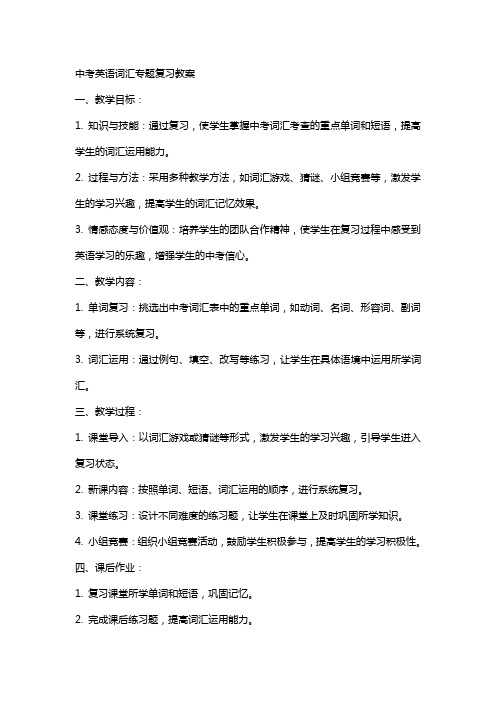
中考英语词汇专题复习教案一、教学目标:1. 知识与技能:通过复习,使学生掌握中考词汇考查的重点单词和短语,提高学生的词汇运用能力。
2. 过程与方法:采用多种教学方法,如词汇游戏、猜谜、小组竞赛等,激发学生的学习兴趣,提高学生的词汇记忆效果。
3. 情感态度与价值观:培养学生的团队合作精神,使学生在复习过程中感受到英语学习的乐趣,增强学生的中考信心。
二、教学内容:1. 单词复习:挑选出中考词汇表中的重点单词,如动词、名词、形容词、副词等,进行系统复习。
3. 词汇运用:通过例句、填空、改写等练习,让学生在具体语境中运用所学词汇。
三、教学过程:1. 课堂导入:以词汇游戏或猜谜等形式,激发学生的学习兴趣,引导学生进入复习状态。
2. 新课内容:按照单词、短语、词汇运用的顺序,进行系统复习。
3. 课堂练习:设计不同难度的练习题,让学生在课堂上及时巩固所学知识。
4. 小组竞赛:组织小组竞赛活动,鼓励学生积极参与,提高学生的学习积极性。
四、课后作业:1. 复习课堂所学单词和短语,巩固记忆。
2. 完成课后练习题,提高词汇运用能力。
3. 自主学习拓展词汇,增加词汇量。
五、教学评价:1. 课堂表现:观察学生在课堂上的参与程度、发言情况等,了解学生的学习状态。
2. 课后作业:检查学生的作业完成情况,评估学生的学习效果。
3. 单元测试:定期进行单元测试,检验学生对中考词汇的掌握程度。
4. 学生反馈:听取学生的意见和建议,不断调整教学方法,提高教学质量。
六、教学策略:1. 多样化教学:运用图片、视频、音频等多种教学资源,丰富教学手段,提高学生的学习兴趣。
2. 情境教学:创设真实的生活情境,让学生在语境中学习词汇,提高词汇的运用能力。
3. 联想记忆:引导学生运用联想记忆法,帮助学生记忆单词和短语。
4. 巩固练习:通过课后作业、课堂练习等形式,及时巩固所学知识。
5. 反馈与评价:定期进行教学反馈,了解学生的学习情况,调整教学策略。
中考英语 情态动词复习教案(表格式)
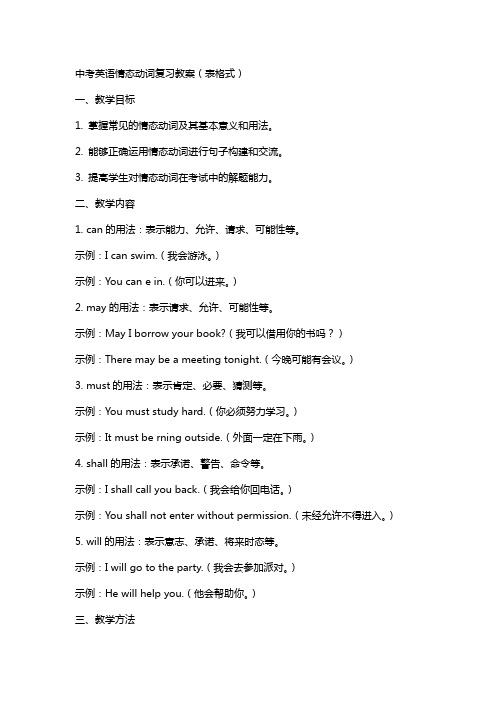
中考英语情态动词复习教案(表格式)一、教学目标1. 掌握常见的情态动词及其基本意义和用法。
2. 能够正确运用情态动词进行句子构建和交流。
3. 提高学生对情态动词在考试中的解题能力。
二、教学内容1. can的用法:表示能力、允许、请求、可能性等。
示例:I can swim.(我会游泳。
)示例:You can e in.(你可以进来。
)2. may的用法:表示请求、允许、可能性等。
示例:May I borrow your book?(我可以借用你的书吗?)示例:There may be a meeting tonight.(今晚可能有会议。
)3. must的用法:表示肯定、必要、猜测等。
示例:You must study hard.(你必须努力学习。
)示例:It must be rning outside.(外面一定在下雨。
)4. shall的用法:表示承诺、警告、命令等。
示例:I shall call you back.(我会给你回电话。
)示例:You shall not enter without permission.(未经允许不得进入。
)5. will的用法:表示意志、承诺、将来时态等。
示例:I will go to the party.(我会去参加派对。
)示例:He will help you.(他会帮助你。
)三、教学方法1. 实例讲解:通过具体例句讲解每个情态动词的用法。
2. 表格对比:列出各情态动词的用法表格,进行对比分析。
3. 练习巩固:设计相关练习题,让学生巩固所学内容。
4. 小组讨论:分组讨论情态动词的用法,促进学生互动。
四、教学步骤1. 导入:简要介绍情态动词的概念及重要性。
2. 讲解:分别讲解每个情态动词的用法,并结合实例演示。
3. 对比:展示各情态动词用法表格,让学生进行对比分析。
4. 练习:设计练习题,让学生进行课堂练习。
5. 讨论:分组讨论练习题,引导学生互相交流心得。
中考情态动词专项复习教学设计
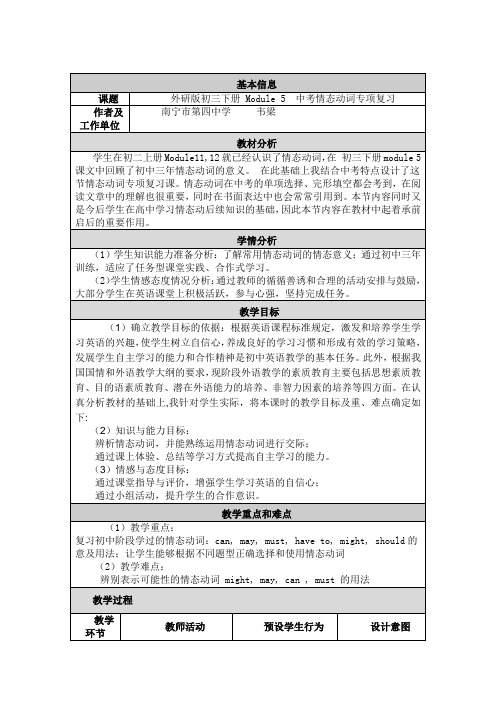
附件:中考情态动词专项复习学案一、考点归纳基础过关写出下列常见情态动词的基本含义和用法1.can/could _______ _______ _______ ________can’t/couldn’t_______ _______ _______ ________2.may/might _______ _______ may not ________3.must________ _________4.mustn’t__________5.needn’t___________6.have to__________ _________ don’t have to_______7.will/would_________ ________ _________8.shall __________ should_________ shouldn’t__________9. had better _______________10. --May / Can I use your cell phone ?的否定回答:--No,you___________. 或No, you____________.11. --Must I finish the work today?的否定回答:--No,you ____________.或No,you ______________.12. --Would you like some juice?肯定回答用______________.否定回答用______________.13. --Shall we go to Nanning No.4 high school?肯定回答用______________.否定回答用_____________.14.—Would you like to go to Nanning No.4 high school?肯定回答用______________.否定回答用_____________.二、真题训练中考实战1. --I hear you’ve got a new bike. ______ I have a look?(2012 苏州)--Yes, certainly.A. MayB. DoC. ShallD. Should2. --Honey , stay at home before I return.(2013 武汉)--I ________, Mum.A. mustB. canC. shouldD. will3. People _______ always be careful with fire, or it can be dangerous.A. canB. needn’tC. mustD. shouldn’t4. --Must we leave for Shanghai now?--No, we ___________. We still have two more hours.A. can’tB. mustn’tC. needn’tD. shouldn’t5.You _______ drive your car so fast. It’s very dangerous.(2013 安徽)A. wouldn’tB. shouldn’tC. couldn’tD. needn’t6. --Can I walk across the road now, mum?(2012 南通)--No, you ___________. You have to wait until the light turns green.A. couldn’tB. shouldn’tC. mustn’tD. needn’t7. --Is Maria knocking at the door? (2012 黄石)--It_________ be her. She is in Australia now.A. can’tB. mustC. mayD. mustn’t8. --Must I finish the homework this afternoon? (2013 钦州)--No,you needn’t . It _________ before Friday.A. can finishB.must finishedC. can be finishedD. must befinished9. --Would you like to see a film with me?--_________.A. yes, I like.B. yes, I would.C. Yes, I would like.D. Yes, I’d like to.10. --Could you please help me choose a camera online?--__________. My computer doesn’t work.A. I’m afraid I can’tB. I don’t careC. I hope soD. Certainly.11. Would you please__________the window? It’s so cold outside.A. openB. openingC. not openD. not to open12. We'd better ______out ,it's raining heavily outside.A.goB.to goC.not goD.not to go三、情景实践能力提升针对下列三种情景,提出你的合理建议。
人教版中考英语专题复习《动词专题》教学设计
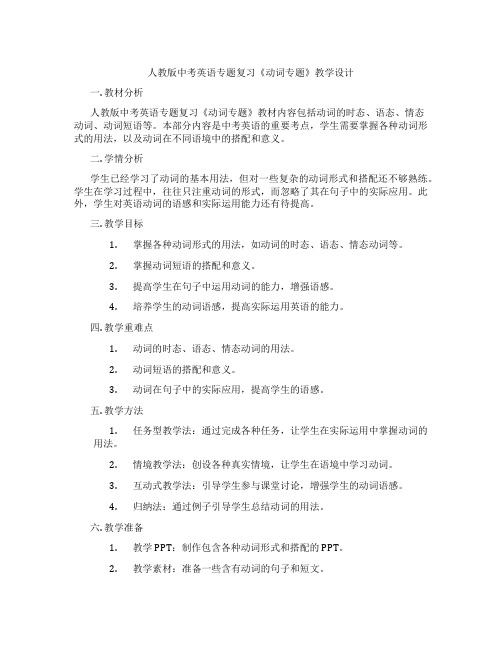
人教版中考英语专题复习《动词专题》教学设计一. 教材分析人教版中考英语专题复习《动词专题》教材内容包括动词的时态、语态、情态动词、动词短语等。
本部分内容是中考英语的重要考点,学生需要掌握各种动词形式的用法,以及动词在不同语境中的搭配和意义。
二. 学情分析学生已经学习了动词的基本用法,但对一些复杂的动词形式和搭配还不够熟练。
学生在学习过程中,往往只注重动词的形式,而忽略了其在句子中的实际应用。
此外,学生对英语动词的语感和实际运用能力还有待提高。
三. 教学目标1.掌握各种动词形式的用法,如动词的时态、语态、情态动词等。
2.掌握动词短语的搭配和意义。
3.提高学生在句子中运用动词的能力,增强语感。
4.培养学生的动词语感,提高实际运用英语的能力。
四. 教学重难点1.动词的时态、语态、情态动词的用法。
2.动词短语的搭配和意义。
3.动词在句子中的实际应用,提高学生的语感。
五. 教学方法1.任务型教学法:通过完成各种任务,让学生在实际运用中掌握动词的用法。
2.情境教学法:创设各种真实情境,让学生在语境中学习动词。
3.互动式教学法:引导学生参与课堂讨论,增强学生的动词语感。
4.归纳法:通过例子引导学生总结动词的用法。
六. 教学准备1.教学PPT:制作包含各种动词形式和搭配的PPT。
2.教学素材:准备一些含有动词的句子和短文。
3.练习题:设计一些针对性的练习题。
4.小组活动准备:划分学习小组,准备相关材料。
七. 教学过程1.导入(5分钟)利用PPT展示一些动词的图片,引导学生回顾动词的基本形式。
然后提问学生:“Can you tell me the past tense of the verb ‘like’?”,引出本节课的主题——动词。
2.呈现(10分钟)通过PPT展示动词的时态、语态、情态动词等,并用例子进行解释。
如:“I like apples.”(一般现在时),“I liked apples yesterday.”(一般过去时)等。
英语中考总复习专题(七) 动词语态学案
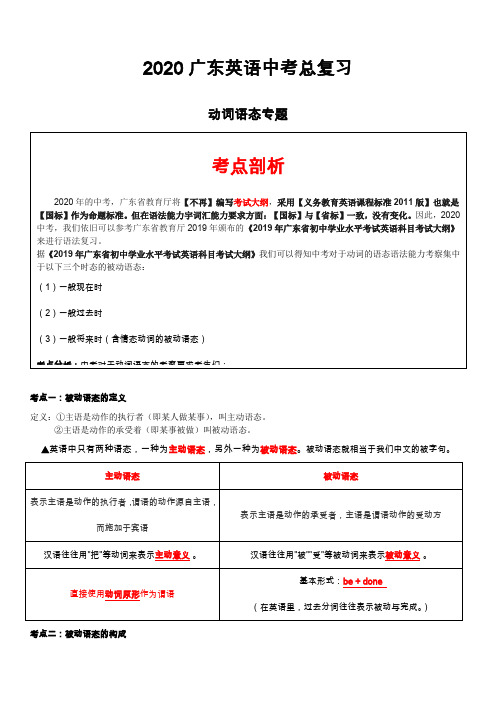
2020广东英语中考总复习动词语态专题考点剖析2020年的中考,广东省教育厅将【不再】编写考试大纲,采用【义务教育英语课程标准2011版】也就是【国标】作为命题标准。
但在语法能力宇词汇能力要求方面:【国标】与【省标】一致,没有变化。
因此,2020中考,我们依旧可以参考广东省教育厅2019年颁布的《2019年广东省初中学业水平考试英语科目考试大纲》来进行语法复习。
据《2019年广东省初中学业水平考试英语科目考试大纲》我们可以得知中考对于动词的语态语法能力考察集中于以下三个时态的被动语态:(1)一般现在时(2)一般过去时(3)一般将来时(含情态动词的被动语态)考点分析:中考对于动词语态的考察要求考生们:考点一:被动语态的定义定义:①主语是动作的执行者(即某人做某事),叫主动语态。
②主语是动作的承受着(即某事被做)叫被动语态。
英语中只有两种语态,一种为主动语态,另外一种为被动语态。
被动语态就相当于我们中文的被字句。
考点二:被动语态的构成例:Kites is flown by him. 风筝被他放I was invited to the meeting last night. 我做完被邀请出席会议Cars will be sent abroad by sea. 汽车将通过海路被运往国外。
A great many letters can be written with the computer by him. 大量的信能被他用电脑写。
考点三:主动语态变被动语态(writing)步骤:①将主动语态的宾语改为被动语态的主语②将主动语态的谓语动词改为‘be done’③将主动语态的主词改为介词by之后的宾语,放在谓语动词之后(有时可省略)例:He cleans the room.→The room is cleaned by him.含直接宾语和间接宾语的主动语态改为被动语态时有两种情况:①把间接宾语改为被动语态的主语,直接宾语仍保留原位;②把直接宾语改为主动语态的主语,此时,间接宾语前要加介词to或for。
中考英语一轮复习---《助动词do, does, did》用法教学设计
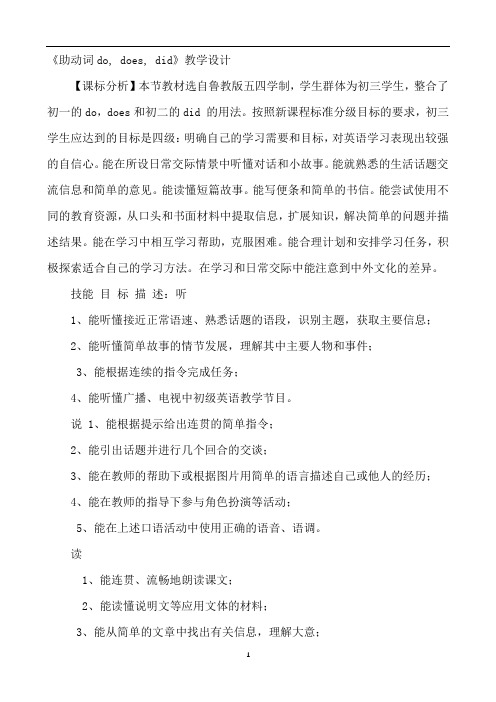
《助动词do, does, did》教学设计【课标分析】本节教材选自鲁教版五四学制,学生群体为初三学生,整合了初一的do,does和初二的did 的用法。
按照新课程标准分级目标的要求,初三学生应达到的目标是四级:明确自己的学习需要和目标,对英语学习表现出较强的自信心。
能在所设日常交际情景中听懂对话和小故事。
能就熟悉的生活话题交流信息和简单的意见。
能读懂短篇故事。
能写便条和简单的书信。
能尝试使用不同的教育资源,从口头和书面材料中提取信息,扩展知识,解决简单的问题并描述结果。
能在学习中相互学习帮助,克服困难。
能合理计划和安排学习任务,积极探索适合自己的学习方法。
在学习和日常交际中能注意到中外文化的差异。
技能目标描述:听1、能听懂接近正常语速、熟悉话题的语段,识别主题,获取主要信息;2、能听懂简单故事的情节发展,理解其中主要人物和事件;3、能根据连续的指令完成任务;4、能听懂广播、电视中初级英语教学节目。
说 1、能根据提示给出连贯的简单指令;2、能引出话题并进行几个回合的交谈;3、能在教师的帮助下或根据图片用简单的语言描述自己或他人的经历;4、能在教师的指导下参与角色扮演等活动;5、能在上述口语活动中使用正确的语音、语调。
读1、能连贯、流畅地朗读课文;2、能读懂说明文等应用文体的材料;3、能从简单的文章中找出有关信息,理解大意;4、能根据上下文猜测生词的意思;5、能理解并解释图表提供的信息;6、能理解简易读物中的事件发生顺序和人物行为;7、能读懂简单的个人信件;8、能使用英汉词典等工具书帮助阅读理解;9、除教材外,课外阅读量应累计达到10万词以上。
写1、能五确使用标点符号;2、能用词组或简单句为自己创作的图片写出说明;3、能写出简短的文段,如简单的指令、规则;4、能在教师的帮助下或以小组讨论的方式起草和修改作文。
本节课要求学生掌握do,does ,did 在一般现在时和一般过去时的用法,在不同人称和数的变化。
- 1、下载文档前请自行甄别文档内容的完整性,平台不提供额外的编辑、内容补充、找答案等附加服务。
- 2、"仅部分预览"的文档,不可在线预览部分如存在完整性等问题,可反馈申请退款(可完整预览的文档不适用该条件!)。
- 3、如文档侵犯您的权益,请联系客服反馈,我们会尽快为您处理(人工客服工作时间:9:00-18:30)。
中考复习专项:动词(一)课型:主备:教师:备课组长:教研组长:班级姓名学号【教材分析】学习动词的分类及非谓语动词。
【学习目标】掌握几种动词的不同形式以及非谓语动词的三种形式的用法。
【课堂助学】一、分类1. 实义动词eat, drink, sleep, run, play…可分为:及物动词、不及物动词、延续性动词和非延续性动词2. 系动词look, sound, smell, keep, stay…(后跟形容词做表语,组成系表结构)状态类:be, stay, seem, keep感官类:feel, look, smell, taste, sound变化类:become, get, go, grow, turn★注意:系动词不能单独作谓语、系动词没有被动语态、不用于进行时除了be动词外,其他的系动词加形容词作表语3. 助动词do/does/did, have/has/had( 完成时中), will ,否定在助动词后直接加not, 问句直接把助动词提到主语前面4. 情态动词can, could, may, might, must, ought, should , need …等。
否定在后面直接加not,问句直接提前情态动词考点分析:1)can/could, be able to区别: 两者都可以用来表示能力。
can只有现在时(can)和过去时(could),而be able to可用于多种时态。
注: can与be able to,不能重复使用2)can/could表示“可能性” 没有时间区别,can 可能性比could 大,表示逻辑上或理论上的可能性,而不是某种实际上将要发生或正在发生的可能性。
He couldn’t be at home.(很可能不在家)He can’t be at home.(不可能在家)3) can/could/may/might 表示“请求;许可”要注意:can/could 提问时的回答Could I use your bike, Mum Yes, you can.辨析:Could you ride a bike last year No, I couldn’t. But I can now.(表能力)4)情态动词的否定: 部分情态动词的否定形式是情态动词考点之一.mustn’t 不准, 禁止needn’t没必要( = don’t have to )can’t 不能; 不可能may not 不可以; 可能不shouldn’t不应该( = ought not to )had better not 最好不要5)need 用法A: 作为情态动词: I need not finish the work now .★注意对need问句的回答: --Must I finish the work today--Yes, you must..肯定)We don’t need to finish the work . (否定)C. 其它用法My bike needs repairing. == My bike needs to be repaired.二、非谓语动词(to do, doing, done)1. to do:动词不定式肯定形式:to do 否定形式:not to doA 常见的动词不定式的搭配want/would like/hope/decide/plan to doask/want/tell/invite/warn sb. (not) to do…It takes sb. some time to do…It’s +adj.+ of/for sb. to do…形容词/副词+ enou gh to do…too … to do…have no choice but to do…what to do…B 与不带to 的不定式的固定搭配make / let / have sb. do sthhad better (not) do sthwhy not/don’t you do…would rather do than do…Would you please (not) do sth.C 动词不定式在句中的作用1) 对我们来说学好英语很重要(主语)________________________is important for us.It is important for us______________________.2) 他们不知道怎么做。
(疑问词+动词不定式作宾语)They don’t know ____________________ .3) 这个游戏的目的是环游世界以了解各地的历史。
(作表语)The purpose of the game is _______________________________each place.4) 你想要的喝的吗(动词不定式做后置定语修饰不定代词)Would you like something__________5) 我们有很多家庭作业要做。
We have a lot of homework________.6) 老师让我们明天把字典带到学校来。
(宾补)The teacher asked us________________________ to school tomorrow.7) 人们急匆匆地将生病的男孩送到医院。
(表目的)People were in a hurry ___________ the boy to the hospital .2. 动词ingA 接V-ing 动名词作宾语的搭配enjoy/finish/practice/keep/mind/spend (time/money)/(suggest)be busy/have difficulty/have funbe worth /have a great time/feel likebe used to look forward topay attention to devote…to…B 易混淆、易错的用法to do / prefer doing to doingdoing 停止做某事stop to do 停下来去做某事3. be used to doing 习惯于做。
be used to do 被用来做。
be used for doing 被用来做。
used to do 过去常做。
4. see Sb. do Sth 看见某人经常做某事或做了某事see Sb. doing Sth 看见某人正在做某事hear Sb. do Sth 听见某人经常做某事或做了某事hear Sb. doing Sth 听见某人正在做某事3. done过去分词: 过去分词做定语可在句中做定语the boy called Tom(叫Tom的男孩), the clothes made of wool(羊毛制成的衣服)要注意做定语的过去分词与被动语态的区别The boy is called Tom. 这个男孩叫Tom (做句子谓语)The clothes are made of wool.这衣服是羊毛制的(做句子谓语)【当堂检测】一.情态动词1. - I'm afraid I need a pair of glasses. I ___ hardly see the words on the blackboard.--That's terrible. You may have got poor eyesight. (12镇江)A. canB. mustC. mayD. need2.—Dad, must I practise the piano today (12盐城)—No, you _______. You may do it tomorrow.A. needn’tB. mustn’tC. shouldn’tD. can’t3.-Excuse me, when are we going to have a picnic (12扬州)-I’m not sure. Ask our monitor, please. He _________ know.A. needB. canC. mayD. shall4. — Dick, I use your e-dictionary (12常州)— Yes, please. you give it to Mike after you use itA. will; WouldB. may; MightC. can; CouldD. shall; Should5. - Can I skate on the lake now - No, you ______. It’s dangerous.A. can’tB. mustn’tC. needn’tD. won’t6. For everyone’s safety, we ____always remember the law against driving after drinking.A. couldB. shouldC. mightD. would7. There are no customers in the hotel. It ______ have the friendliest service.A. can’tB. mustC. mayD. needn’t8. The magazine________ be Lily's, for we can find her name on the cover.A. mayB. mightC. couldD. must9. — Where's David— He ______be in the playground because he is fond of playing basketball.A. willB. mayC. can'tD. mustn'tlady in this photo __________ be over fifty! She looks so young! (12无锡)A. mustn’tB. mustC. can’tD. can二.非谓语动词A 用所给动词的适当形式填空1. Would you like ____________(have) something to eat2. They decided _____________ (not take) part in the evening party at last.3. Don’t forget _____________(turn) off the lights before you go out.4. The boy can’t wait ________________ (play) basketball as soon as he gets home.5. They warned us_______________ (not eat) too much in the evening.6. How long does it take you _____________ (prepare) for the test7. It’s unnecessary for students ______________(have) so many lessons.8. All of our teachers are patient enough ___________ (help) us with our study.9. ___________(drive) to work takes me more time because of too much traffic.10. It is our first time ________(visit) Paris.11. If you have any difficulty _______ (solve) this problem, please ask for help.12. He had no choice but ____________(accept) it .you please ______________(not open) the window now14. You’d better _______________(not watch) too much TV.15. Let the students _____________(finish) their homework first.16. You can improve your English by __________ (do) more reading .17. All the children are busy ___________ (do) their homework.18. She spent much time ___________ (chat) with her friends online.19. My daughter practices ___________(play) the piano at the weekend.20. Would you mind my ____________(shut) the door It’s so cold .21. During lunchtime, we have a great time _____________(talk) to each other .B 易混淆词、词组练习1. Don’t forget to take your bag when you ________ the bus.(2012徐州)A. get offB. take offC. turn offD. put off2. Cao Wenxuan’s new book has just _______. Let’s go and buy one. (12盐城)A. come overB. come downC. come onD. come out3. -Don’t ________, my children. Keep working hard and you will win the match.-Thank you, Mr. Zhang. We’ll try our best. (12扬州)A. put upB. call upC. set upD. give up4. -Jason is too stubborn sometimes. (12无锡)-I quite ________. But he’s always friendly to others.A. acceptB. argueC. agreeD. admire5. The students are______ the leaflets to people over there to ask them to protect our earth.A. printing outB. giving outC. selling outD. putting out (12南通)6. —Allen, your bedroom is in a mess. (12宿迁)—Sorry, Mum. I’ll ______ my things at once.A. put onB. put awayC. put outD. put up7. —What should I do when the earthquake happens, Dad 【12泰州】—First of all, it’s important to _________ and hide yours elf in the corners of the room.A. calm downB. put downC. get downD. fall down8. A YOG Volunteer team mostly _______ university and middle school students. They will mainly provide languages voluntary services. (12南京)A. consists ofB. belongs toC. thinks ofD. leads to9. ---Excuse me , Sir . But smoking is not allowed here. (12连云港)---Sorry, I didn’t see the sign. I’ll ___________________ my cigarette at once.A. put outB. put awayC. put upD. put off10. — Why have you got so much water here (12常州)— For the trailwalkers. After they finish the tough hike, they need to lots of water.A. keep offB. give outC. take inD. put up 【教学后记】_______________________________________________________________________ _______________________________________________________________________。
